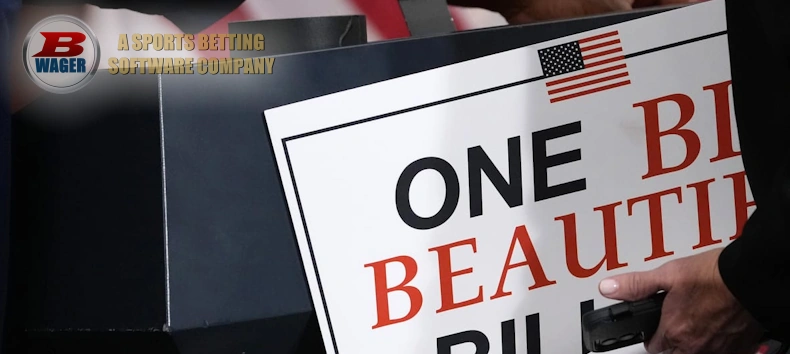The House Doesn’t Always Win: How Trump’s “Big Beautiful Bill” Is About to Gut the Gambling Industry
They’re calling it the Big Beautiful Bill. Looks slick on the outside with bipartisan, pro-business, full of shiny tax breaks for corporations and credits for families. But for those of us in the gambling world, bookies, bettors, casinos, sharps, squares, the Big Beautiful Bill ss Bad News for Bettors as hides an ugly little provision that’s about to upend the entire game.
See, in our world, margins are thin, volatility is high, and trust in the system matters. And now, Washington’s quietly slipped in a new rule: starting in 2026, gamblers can only deduct 90% of their losses. That remaining 10%? Taxed like it’s income even if they broke even on the year.
It’s a bad beat. And it’s not just rough on bettors, it’s bad for licensed sportsbook but good for the offshore sports betting industry.
From the other side of the counter, I see what’s coming: sharp money drying up, action shifting offshore, casuals scared off by tax-time surprises. This isn’t just a line change. It’s a foundational shift that could cripple the legal betting economy before it ever matures.
Let’s break down exactly what this bill does, why it matters, and how some folks, like Nevada’s own Rep. Dina Titus, are trying to fix it before the damage is done.
What Is the Big Beautiful Bill?
This is the nickname for the new bipartisan tax package making its way through Congress, backed by both Democratic and Republican leadership. It’s being hailed as a major economic compromise: it expands child tax credits and restores some business deductions (like bonus depreciation and R&D expenses), so corporate America is cheering. But buried in this pretty package is a rotten clause for gamblers.
A small provision, easily overlooked by the general public, changes how gambling losses can be written off. Starting in 2026, only 90% of gambling losses will be deductible for tax purposes.
That’s not a detail. That’s a game-changer for sportsbooks and gamblers.

What the Big Beautiful Bill Means for Gamblers
Right now, a professional or high-volume recreational gambler can offset their winnings by deducting their losses. Win $200,000 but lose $200,000? You’re even. No taxable income. Fair is fair.
But under this new rule, that same bettor would only be able to deduct $180,000 in losses. So now, on paper, they’ve earned $20,000 even though they’re net zero. That $20k gets taxed like it’s real income.
For whales and grinders, people who bet six or seven figures a year, this is catastrophic. It effectively punishes volume. The more you play, the more phantom income you generate. In a game already driven by tight margins and ruthless variance, that extra tax exposure could be the difference between profit and bust.
What the Big beautiful Bill Means for Licensed Sportsbooks in the U.S.
Now here’s where it gets real for Licensed Sportsbooks in the U.S.
Legal Sportsbooks in the U.S. thrive on liquidity. High-volume players, whether they win or lose, keep the lines moving. They balance the books. It forces them to stay sharp. This bill dries up the pool.
Here’s how:
- Pros Reduce Action: If you can’t deduct losses, you’re not just fighting the juice, you’re fighting Uncle Sam. Professional bettors will scale back or exit.
- Recreational Bettors Lose Confidence: Imagine thinking you’re gambling responsibly, staying even, and still getting taxed. The “regulated market” feels like a trap.
- Offshore & Illegal Markets Gain: When the legal landscape becomes punitive, people go underground. That’s not speculation, it’s history.
- Less Data, More Risk: Legal sportsbooks rely on betting data to calibrate odds and liability. Fewer high-volume bettors mean worse models and higher variance for the house. That risk flows downstream to every other bettor via higher juice, lower limits, or worse promos.
The Bigger Problem: Bad Optics, Worse Policy
This isn’t about whether gambling is good or bad. The U.S. legalized sports betting with the understanding that a regulated market is safer, fairer, and more transparent. And yet, this bill effectively punishes people for using that market.
The Horse racing, poker, sports betting industries rely on the ability to scale volume with reasonable tax treatment. Kill that? You kill the edge. You push out the sharpest minds. You lose a chunk of the ecosystem that, ironically, helps keep the rest of it honest.

Why Offshore Sportsbooks are Loving the Big Beautiful Bill
No IRS, No Problem
Offshore sportsbooks whether they’re in Costa Rica, Antigua, or the gray zones of the internet—don’t issue W-2Gs, don’t report winnings, and don’t care about U.S. tax law. This goes the same for local bookies. So when American bettors realize they’ll be taxed on phantom income at regulated books, they’re going to ask themselves a simple question:
“Why bet in a legal market where I get screwed, when I can go offshore and avoid taxes entirely?”
For local bookies, this is an opportunity to increase their player base.
Bookies didn’t have to lift a finger. Congress just handed them a flood of new customers.
The 90% loss deduction cap is a gift to offshore sportsbooks.
Legal U.S. books now force bettors to pay taxes on phantom income—even when they break even. Offshore books? No tax forms, no W-2Gs, no reporting. Bettors chasing privacy or profit see the writing on the wall: why play by the rules when you get punished for doing it?
With this rule, sharp bettors and volume players have every reason to go dark by using VPNs and offshore accounts where they keep every dollar and Uncle Sam stays out of the picture.
Local bookies and offshore sportsbooks are laughing. They didn’t have to spend a dollar lobbying for this. Congress just handed them a win. In fact, our own bookie pay per head services has seen an increase in registration because of it.

The FAIR BET Act: Rep. Dina Titus Steps In
Just when the new tax rule started rattling nerves, Democratic Nevada Rep. Dina Titus announced a lifeline. On Friday, July 4, 2025, she revealed plans to introduce the FAIR BET Act, short for Fair Accounting for Income Realized from Betting Earnings Taxation Act. The goal? Restore the full 100% deduction for gambling losses, reversing the 10% cut buried in President Trump’s “Big Beautiful Bill” budget package.
Titus, who co-chairs the Congressional Gaming Caucus and represents the casino-heavy district that includes Las Vegas, didn’t mince words. Posting on X, she criticized the change as “buried within the BS Republican Budget bill” and argued it “harms poker players and those who gamble” by unfairly slashing loss deductions from 100 to 90%.
In a follow-up press statement, she emphasized the stakes:
“This is just another attack on gaming and tourism and on districts like mine that rely on these industries,” adding it punishes responsible taxpayers and nudges them toward offshore, untaxed platforms.
Under the FAIR BET Act, bettors who currently face phantom income would see things returned to “even money” status. The full write-off reinstated, meaning tax liability only arises on genuine net winnings. It’s a clear attempt to protect both large-volume recreational players and the broader regulated ecosystem.
Bottom Line on Why the Big Beautiful Bill Is Bad News for Bettors and for Sportsbooks
Titus’s intervention isn’t just political theater; it’s a direct push to reverse a tax tweak that could jeopardize the regulated gambling economy. From line management to promotional strategies, our business needs the full write-off. The FAIR BET Act aims to deliver just that. If it becomes law, expect a steadying effect. If it stalls or fails, brace for pullback across the board.

